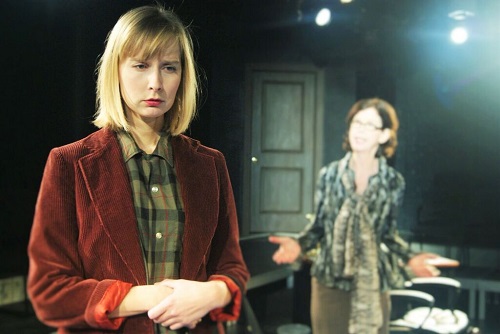 “Searing” play, Dalton and Company, takes on universal issues, now on stage in Toronto
“Searing” play, Dalton and Company, takes on universal issues, now on stage in Toronto
What is the sound of one office door slamming? It’s a sound you’ll hear a lot in Dalton and Company, Paul Dunn’s gripping new play about the loneliness of academia and office politics, presented by Cart/Horse Theatre at The Theatre Centre.
Daniel Dalton is an English and Creative Writing professor at an unnamed university, one of those luminaries who gather admirers in their wake, hoping the artistic genius will throw them a crumb.
His acolytes include his long-suffering office assistant, Karen (Catherine Fitch), and competing graduate students Linda (Julia Course, abrasive and driven) and Randy (Andy Trithardt, easygoing and flirtatious). They wait for approval in a comfortable holding pattern until, like a catalyzing bolt out of the blue, Charlie (Marcel Stewart), a “slow starter” who is taking catch-up technical writing classes, finds an ad for menial office work and a clearance copy of Dalton’s first book, and takes it as a sign. Overconfident and under-credentialed, he charms his way into the office, catches the eye of the man behind the office door, and all hell breaks loose.
I’m a contract English professor who teaches both literary analysis and technical writing classes. I’ve never really left academia, so this play hits very close to home, but the issues here are universal. Late Columbia University professor Wallace Sayre is famously quoted as saying, “The politics of the university are so intense because the stakes are so low,” and this is true in the scheme of things. However, the questions the play raises about entitlement, privilege and inequality are anything but low-stakes, and give the play a searingly inquisitive quality.
What makes this play special is the maturity and tension in the writing, and the fairness with which it treats its characters. Nobody is the villain here (besides perhaps the unseen Dalton, who looms like a tyrannical spectre over the proceedings without ever showing his face). They all are “right,” but they all also ignore their own privilege. You’re never quite sure who to cheer for, but that’s because you feel for each one.
The questions of privilege and its intersection with sexism, racism, and sexuality are threaded throughout the narrative, insistently but with refreshing subtlety. For example, during an interview, Randy is able to make Dalton laugh, while Linda cannot. Is this a sad holdover from the “old boy’s club,” a function of the difference in their personalities, or has Linda cultivated this anguished and brittle front because of its perceived need, sniping because she feels she must work twice as hard to merely be acknowledged?
Did Charlie, who “falls into life sideways,” steal an opportunity that wasn’t deserved, or did he simply level the playing field with the abilities and chances he does have? Occasionally, there’s a lapse in that subtlety, like when Linda immediately snaps at Charlie to “know [his] place,” but those are few and far between. At the end, when everything is laid bare, it feels raw and necessary.
The sympathy for each character is a product of both the sensitive writing and complex, nuanced acting, which is excellent across the board.
Trithardt’s Randy starts off slightly irritating and glib, with his flippant façade and come-ons to Linda, but gradually hardens into disappointment and loss. His shoulders hunch more and more over the never-ending pile of papers.
Stewart’s Charlie is all cheerful, naïve bluster, until he realizes he may be in over his head, or at least his merits. Course’s Linda is a glass volcano, trying to mold the world into her idea of fairness through sheer force of will.
Catherine Fitch is particularly captivating as Karen, the eternal bridesmaid of academia, where the work is the bride. She has the most to lose: a 25-year relationship as the woman beside the man who’s not there anymore.
The play is nicely set “in the round,” with the audience surrounding the action, and the two doors at the corners providing ingress and egress, hinting at the forbidden nature of the professor’s office and the trapped state of the characters. We see only the outer office, and the world outside seems uncertain and a little terrifying. Will anyone have the courage to leave permanently? Is it worth it to stay?
As another best-selling author might say, “For what shall it profit a man, if he should gain tenure, but lose his own soul?”
Details:
- Dalton and Company runs from February 12-28 at The Theatre Centre (1115 Queen Street West)
- Performances are Tuesday-Saturday at 7pm, Sunday at 3pm
- Tickets are $25 (Tuesdays are PWYC) and can be reserved by calling 416-538-0988 or online
Photo of Julia Course and Catherine Fitch taken by Matt Gorman
